When hunger strikes between meals, it’s tempting to reach for something quick often loaded with sugar or empty calories. But what if you could snack without adding to your daily intake? That’s where very low-calorie snacks come in, offering minimal calories to help curb cravings. These options help curb cravings, support your health goals, and keep your hands (and mouth) busy without tipping the scale.
If you want to go beyond zero-calorie snacks and build a full eating plan that supports your goals, ReciMe can help. It lets you save healthy snack recipes from Instagram, TikTok, Pinterest, and YouTube, create meal plans tailored to your needs, and generate grocery lists organized by aisle so you can shop smarter. All this makes it easy to keep your nutrition balanced, with snacks and meals that work together. Grab ReciMe now, power up your nutrition, and let’s explore the world of zero-calorie snacks!

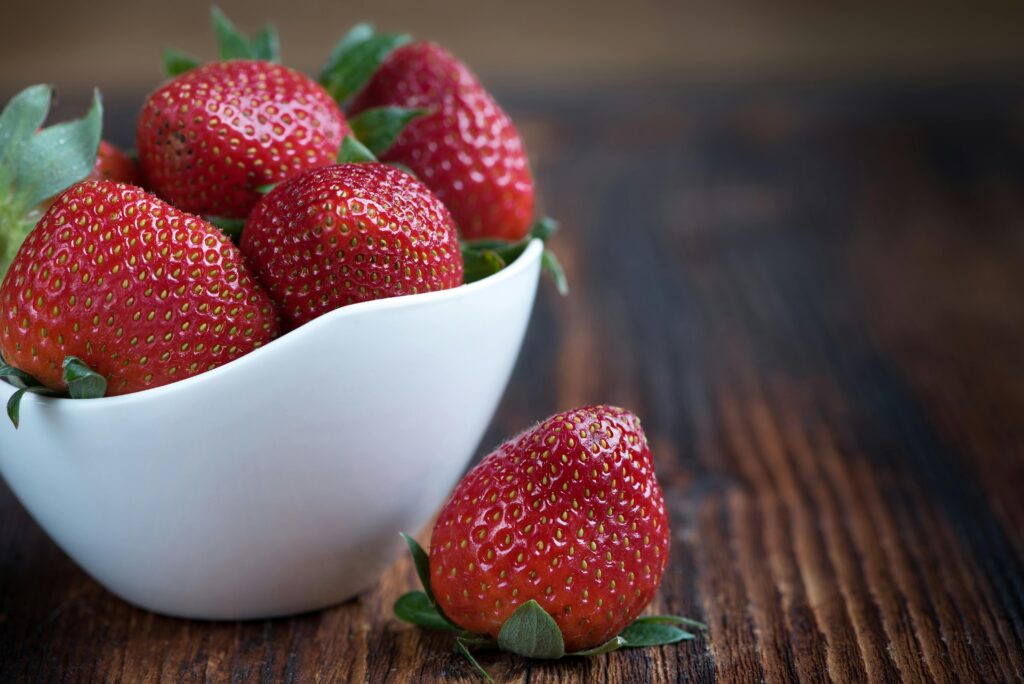
1. Strawberries
Strawberries are a popular fruit choice for snacking due to their natural sweetness and versatility. They provide a rich source of vitamin C and antioxidants, which play a role in protecting cells from damage caused by free radicals. Regular consumption of strawberries is linked to cardiovascular health benefits, making them a nutritious option to include in a balanced diet.
Beyond their health properties, strawberries can be enjoyed in many ways – fresh, in smoothies, or as a topping for yogurt or salads. Their light and refreshing flavor makes them a satisfying snack that can help curb hunger between meals without adding excessive calories.
Key Highlights:
- Rich source of vitamin C
- Contains antioxidants that help protect cells
- Supports cardiovascular health
- Versatile and easy to include in meals or snacks
Who It’s Best For:
- People looking for a healthy, natural snack option
- Those aiming to support heart health through diet
- Anyone who enjoys fresh, sweet flavors in their snacks
2. Seaweed Snacks
Seaweed snacks, typically made from dried and baked kelp, offer a unique and flavorful option for light snacking. They provide important nutrients such as iodine, which supports thyroid function, as well as copper, riboflavin, thiamin, and iron. These nutrients contribute to overall health and help fill nutritional gaps in the diet.
When choosing seaweed snacks, it’s important to select varieties that aren’t fried or coated with added sugars, as those can significantly increase calorie content. Plain dried seaweed snacks can be a convenient and nutrient-rich way to add variety to your snacking routine while keeping calorie intake low.
Key Highlights:
- Contains iodine to support thyroid health
- Provides minerals like copper and iron
- Offers B vitamins including riboflavin and thiamin
- Low in calories when not fried or sweetened
Who It’s Best For:
- Individuals seeking nutrient-dense, low-calorie snacks
- People interested in supporting thyroid function through diet
- Those looking for a savory alternative to traditional snacks
3. Plain Greek Yogurt (Non-Fat)
Non-fat plain Greek yogurt is a popular choice for those seeking a high-protein, low-calorie snack. It offers a substantial amount of protein, which can support muscle maintenance and overall satiety. Its neutral flavor also makes it easy to pair with a variety of additions like berries or other low-calorie fruits, enhancing both taste and nutritional value.
This yogurt is especially beneficial for vegetarians or anyone looking to increase their protein intake without adding extra fat or calories. It can serve as a filling snack option that helps manage hunger between meals while supporting fitness and nutrition goals.
Key Highlights:
- High in protein
- Low in fat and calories
- Neutral taste suitable for mixing with fruits or flavorings
- Supports muscle maintenance and satiety
Who It’s Best For:
- Vegetarians seeking plant-friendly protein sources
- Those wanting a filling, low-calorie snack
- People who enjoy versatile dairy snacks that can be customized
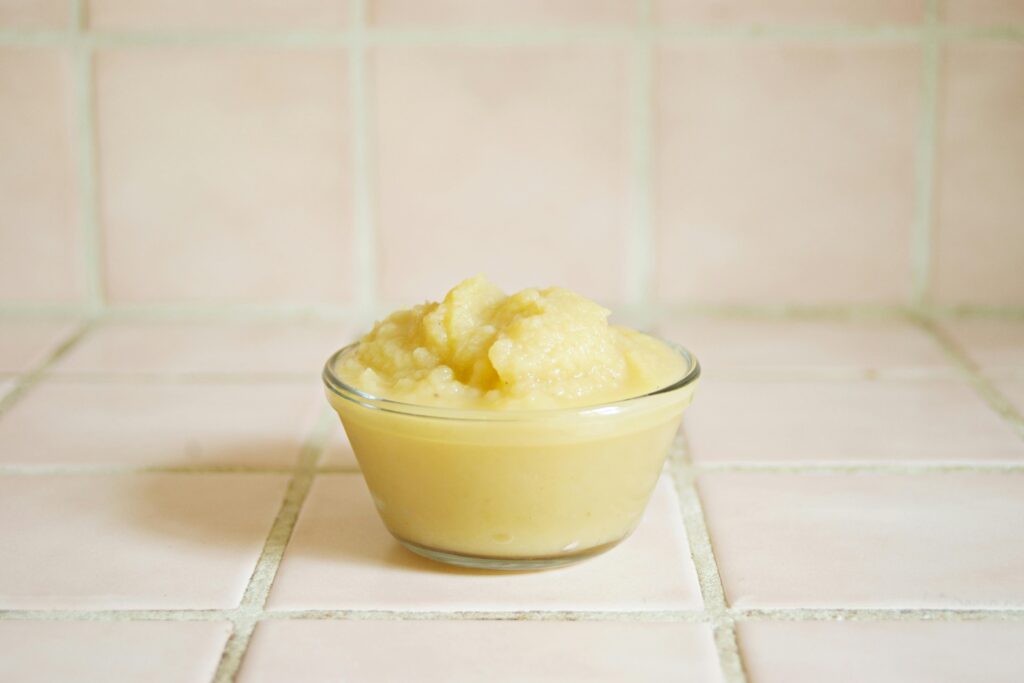
4. Unsweetened Applesauce
Unsweetened applesauce is a straightforward snack made by cooking apples with water, resulting in a naturally sweet and fiber-rich option. Its mild flavor makes it appealing for those who enjoy apples but want a softer texture. Because it contains little to no added sugar, it remains a low-calorie choice that can satisfy sweet cravings without excess calories.
This snack is also budget-friendly and easy to prepare at home, offering a practical alternative when store-bought unsweetened applesauce is unavailable. It fits well into a balanced diet for anyone looking to keep snacking light and nutritious.
Key Highlights:
- Made from cooked apples and water
- Naturally sweet with no added sugar
- Contains dietary fiber
- Easy and inexpensive to prepare at home
Who It’s Best For:
- People seeking a naturally sweet, low-calorie snack
- Those who want to increase fiber intake
- Individuals looking for convenient homemade snack options
5. Air-Popped Popcorn
Air-popped popcorn, without added butter or oil, offers a light and low-calorie snack option. It contains protein and fiber, which contribute to feelings of fullness and aid digestion. Additionally, popcorn provides essential nutrients like magnesium, iron, and vitamin B6, supporting overall health.
When choosing popcorn as a snack, it’s important to avoid versions that include added fats, sugars, or flavorings, as these can significantly increase the calorie content. In moderation, plain air-popped popcorn can be a satisfying and nutritious choice for those looking to keep their snacking light.
Key Highlights:
- Low in calories when air-popped without additives
- Provides protein and dietary fiber
- Contains minerals such as magnesium and iron
- Includes vitamin B6
Who It’s Best For:
- Individuals seeking a light, crunchy snack
- People who want to add fiber and protein to their diet
- Those avoiding high-fat or sugary snack options
6. Plain and Unsalted Brown Rice Cakes
Plain and unsalted brown rice cakes offer a simple and convenient snack option that is low in calories when consumed in typical serving sizes. They provide a source of carbohydrates, protein, and dietary fiber, which can help maintain energy levels and promote feelings of fullness between meals.
Due to their light texture and mild flavor, brown rice cakes can be enjoyed on their own or paired with other healthy toppings. They are easy to carry and make for a practical choice when looking for a quick, low-calorie snack.
Key Highlights:
- Low-calorie option in typical serving sizes
- Contains carbohydrates, protein, and fiber
- Simple and mild flavor
- Convenient and portable snack
Who It’s Best For:
- People seeking a light and easy snack
- Those looking for a low-calorie source of carbs and fiber
- Individuals wanting a versatile base for healthy toppings

7. Bell Peppers
Bell peppers, whether red, green, or yellow, are a low-calorie vegetable snack that offers a crisp and refreshing taste. They are an excellent source of vitamin C, which supports immune function and overall health. Eating bell peppers raw helps preserve their nutrients, making them a convenient and nutritious option for snacking.
Their natural sweetness and crunch make bell peppers enjoyable on their own or paired with dips and spreads. They fit well into a balanced diet by providing vitamins and fiber while keeping calorie intake low.
Key Highlights:
- Low in calories
- High in vitamin C
- Best eaten raw to retain nutrients
- Crisp texture and natural sweetness
Who It’s Best For:
- People looking for a crunchy, low-calorie vegetable snack
- Those aiming to boost vitamin C intake
- Anyone wanting a fresh, easy-to-prepare snack
8. Brussels Sprouts
Brussels sprouts are a nutrient-dense vegetable that can be enjoyed in various ways while remaining low in calories. They provide vitamin C and dietary fiber, both important for immune health and digestion. Their high water content also helps promote hydration and satiety.
Thanks to their versatility, Brussels sprouts can be steamed, roasted, sautéed, or added to soups and stir-fries. This makes them a flexible option for those looking to include more vegetables in their diet without increasing calorie intake significantly.
Key Highlights:
- Low in calories
- Good source of vitamin C and fiber
- High water content
- Versatile cooking methods
Who It’s Best For:
- People wanting to increase vegetable intake
- Those looking for nutrient-rich, low-calorie snacks
- Anyone who enjoys versatile cooking options
9. Zucchini
Zucchini is a low-calorie summer squash that offers several essential nutrients, including vitamin A, manganese, magnesium, vitamin C, and potassium. Its mild flavor and crisp texture make it easy to incorporate into a variety of dishes or enjoy raw.
One popular way to use zucchini is by making “zoodles,” a low-carb alternative to pasta. These can be prepared quickly with a spiralizer or julienne peeler and lightly cooked or eaten raw. Zucchini provides a refreshing, nutrient-rich option for snacking or meal preparation while keeping calories low.
Key Highlights:
- Very low in calories
- Contains vitamins A and C, plus minerals like manganese and potassium
- Can be eaten raw or lightly cooked
- Popular as a low-carb pasta substitute (“zoodles”)
Who It’s Best For:
- Those seeking low-calorie, nutrient-dense vegetables
- People looking for creative, low-carb meal options
- Anyone wanting a versatile vegetable snack
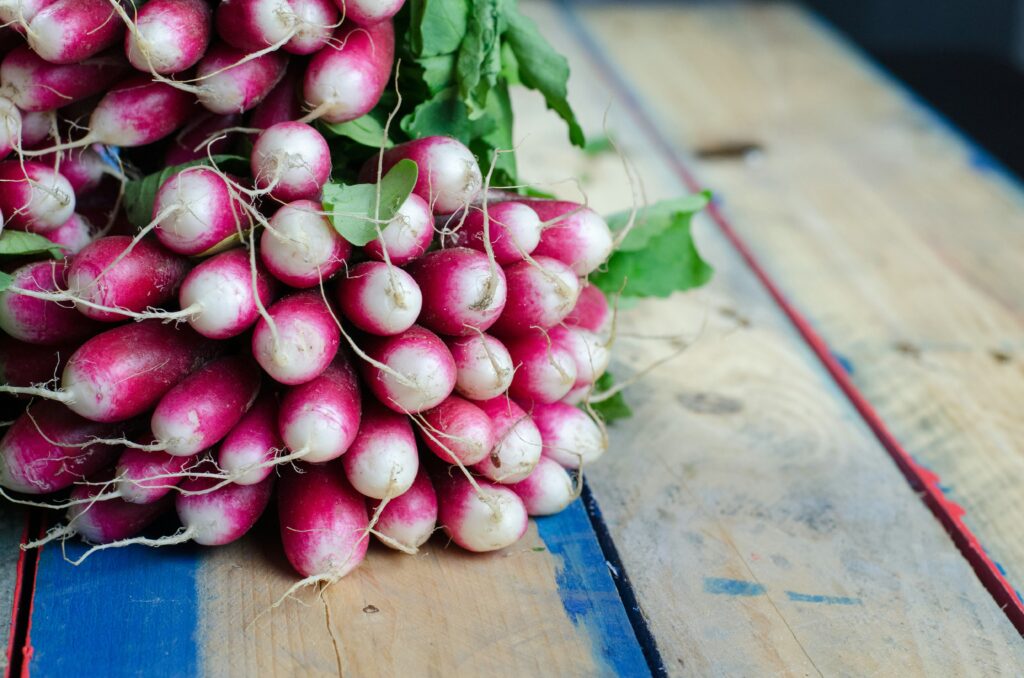
10. Radishes
Radishes are a crunchy, low-calorie vegetable known for their potential health benefits beyond basic nutrition. They possess antifungal properties and may help protect the stomach lining from ulcers. Some studies also suggest a possible link between radish consumption and a reduced risk of certain cancers.
Though radishes might not be a common go-to snack, their distinctive flavor and health-promoting qualities make them a noteworthy addition to a low-calorie snack list. They can be eaten raw, sliced, or added to salads for an extra crunch.
Key Highlights:
- Very low in calories
- Contains antifungal properties
- May support stomach health and lower cancer risk
- Crisp texture and peppery flavor
Who It’s Best For:
- People looking for unique, nutrient-rich snacks
- Those interested in foods with potential health benefits
- Anyone wanting to add variety to their low-calorie snacks
11. Cantaloupe
Cantaloupe is a low-calorie melon that offers several health benefits alongside its naturally sweet taste. It contains nutrients like lutein and zeaxanthin, which help support eye health, as well as vitamin C, known for its role in boosting the immune system.
This fruit’s juicy texture and refreshing flavor make it a satisfying snack option, especially during warmer months. Cantaloupe provides essential vitamins and hydration while keeping calorie intake low.
Key Highlights:
- Low in calories
- Contains lutein and zeaxanthin for eye health
- Provides vitamin C to support the immune system
- Juicy texture and natural sweetness
Who It’s Best For:
- People seeking a refreshing, nutrient-rich snack
- Those interested in supporting vision and immunity
- Anyone looking for a naturally sweet, low-calorie fruit
12. Apricots
Apricots are a low-calorie fruit rich in polyphenols and antioxidants, which may help regulate blood sugar levels and offer protection against diabetes. Their natural fiber content supports digestion and contributes to a feeling of fullness, making them a satisfying snack option.
Including apricots regularly in a balanced diet can support weight management while providing a sweet, nutrient-rich alternative to higher-calorie treats. Their flavor and health benefits make them a valuable addition to low-calorie snack choices.
Key Highlights:
- Low in calories
- Contains polyphenols and antioxidants
- May help regulate blood sugar levels
- Good source of dietary fiber
Who It’s Best For:
- People managing blood sugar through diet
- Those looking for filling, low-calorie fruits
- Anyone wanting a naturally sweet, nutrient-dense snack
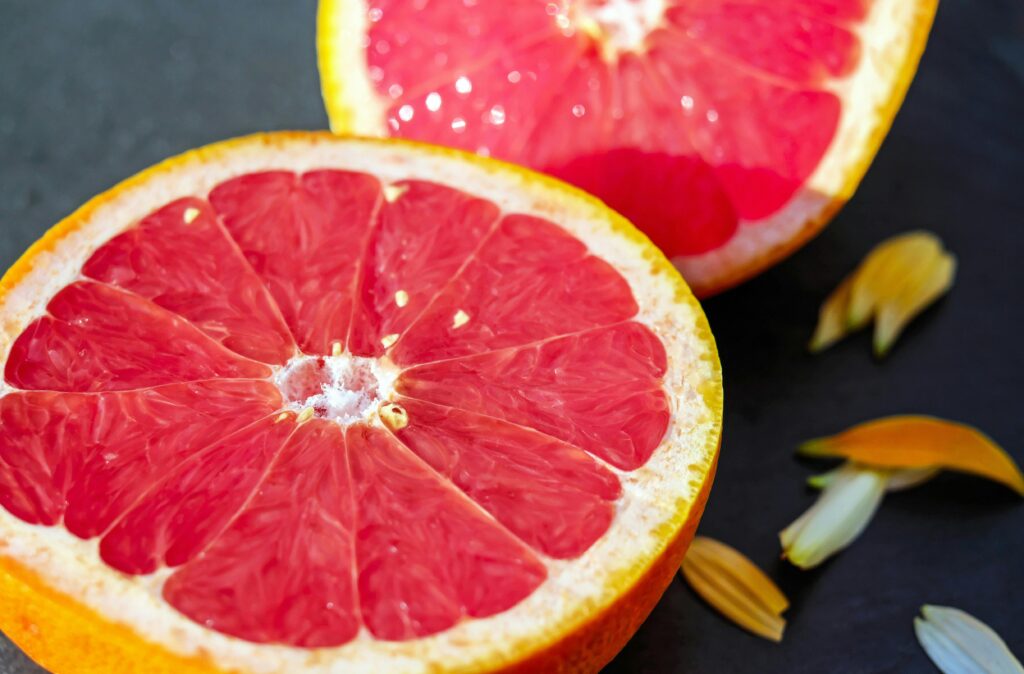
13. Grapefruit
Grapefruit is a low-calorie fruit known for its rich vitamin C content and additional nutrients like vitamin A, which supports eye health. Its fiber content helps promote feelings of fullness, which can aid in weight management.
Beyond vitamins, grapefruit contains antioxidants that may protect against chronic diseases and contribute to overall health. Its slightly tart flavor and refreshing juiciness make it a popular choice for a light, nutritious snack.
Key Highlights:
- Low in calories
- High in vitamin C and vitamin A
- Contains fiber to support fullness and weight management
- Rich in antioxidants
Who It’s Best For:
- Individuals looking to support eye health and immunity
- Those wanting a filling, low-calorie fruit snack
- People interested in antioxidant-rich foods
14. Apples
Apples, regardless of variety – red, green, or golden are a low-calorie fruit rich in flavonoids, a type of antioxidant, as well as fiber, vitamin C, and potassium. Their crisp texture and natural sweetness make them a satisfying snack option.
For maximum nutritional benefit, it is recommended to eat apples with the peel on, as the skin contains valuable antioxidants. Washing apples thoroughly before eating is important, and choosing organic apples can help reduce exposure to pesticides.
Key Highlights:
- Low in calories
- Contains antioxidants called flavonoids
- Provides dietary fiber, vitamin C, and potassium
- Nutrients concentrated in the peel
Who It’s Best For:
- People seeking a crunchy, naturally sweet snack
- Those wanting to increase antioxidant and fiber intake
- Individuals aiming for whole-food, minimally processed snacks
15. Blueberries
Blueberries are a low-calorie fruit prized for their high content of anthocyanins, powerful antioxidants that offer various potential health benefits. These include reducing inflammation, protecting against type 2 diabetes, and helping to lower blood pressure.
To gain the most from blueberries, they should be eaten regularly. Their sweet flavor and small size make them easy to add to foods like porridge, salads, yogurt, or smoothies, making them a versatile and nutritious snack choice.
Key Highlights:
- Low in calories
- Rich in anthocyanin antioxidants
- May help reduce inflammation and support metabolic health
- Versatile for use in many dishes
Who It’s Best For:
- People seeking antioxidant-rich fruits
- Those aiming to support blood sugar and blood pressure levels
- Anyone looking for a tasty, easy-to-use snack addition
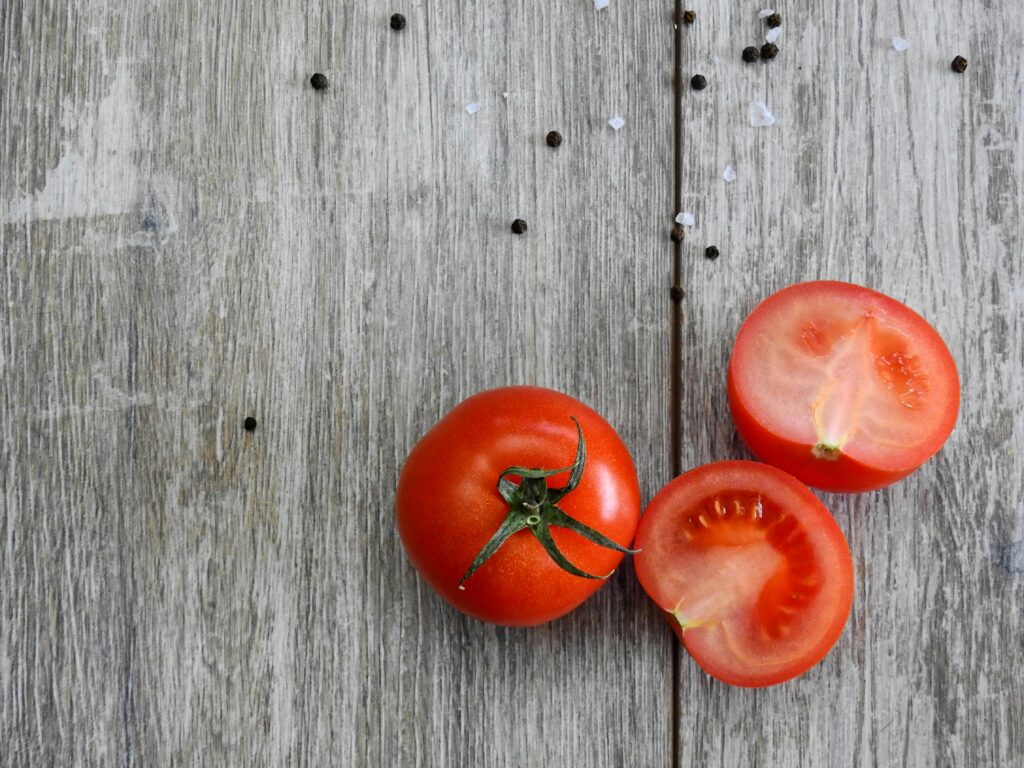
16. Tomato Slices
Tomatoes are a versatile snack option that can be enjoyed fresh and raw. Their juicy texture and mild tanginess make them satisfying on their own or lightly seasoned, such as with black pepper.
Rich in antioxidants like lycopene, tomatoes contribute to overall health and may help reduce cravings. They are also hydrating and naturally low in sugar, making them a suitable choice for regular, low-calorie snacking.
Key Highlights:
- Low in calories
- Contains antioxidants such as lycopene
- Hydrating and low in sugar
- Refreshing and mildly tangy flavor
Who It’s Best For:
- People seeking fresh, hydrating snacks
- Those interested in antioxidant-rich foods
- Anyone looking for a flavorful, low-calorie vegetable option
17. Carrots
Carrots are a nutrient-rich vegetable that can be enjoyed raw as a crunchy, low-calorie snack. They provide important nutrients including beta carotene, fiber, vitamin K, potassium, and antioxidants, all of which contribute to overall health.
Their natural sweetness and satisfying texture make carrots a convenient and healthy option for snacking. They fit well into a balanced diet by offering essential vitamins and minerals while keeping calorie intake low.
Key Highlights:
- Low in calories
- Rich in beta carotene and antioxidants
- Contains fiber, vitamin K, and potassium
- Crunchy texture and natural sweetness
Who It’s Best For:
- Individuals seeking nutrient-dense, low-calorie snacks
- Those wanting to increase vitamin and fiber intake
- People who enjoy fresh, crunchy vegetables
Conclusion
Low-calorie snacks are a great way to satisfy hunger between meals without adding unnecessary calories. Vegetables, fruits, and other natural foods provide essential vitamins and minerals while helping you feel full and energized.
When choosing snacks, it’s important to focus on their nutritional value and variety to keep your diet balanced and enjoyable. With so many low-calorie options available, everyone can find snacks that fit their tastes and lifestyle.
